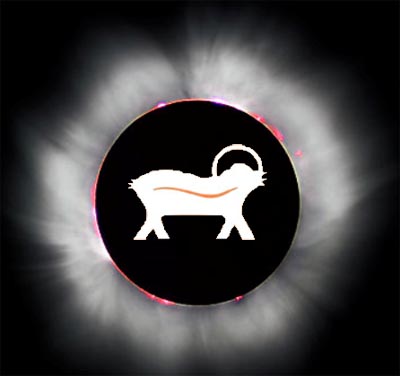Rational Faith
a Christmas day meditation
 |
An eclipse of the sun reveals the hidden corona in the same manner the incarnation reveals the invisible of God. |
| An Eclipse of the sun revealing the corona, superimposed with a baby in the manger - the son of God who reveals the father. |
A total eclipse of the sun: Modern day scientists have called it "an amazing, awe inspiring, tremendously moving event"1 and " a spectacle that few people who see one will ever forget." Total eclipses of the sun have been tracked for over two millennia, as witnessed by the fact that the Babylonians figured out the Saros cycle - the cycle for when eclipses will repeat - 22 centuries ago. Recently it was discovered that the Saros cycle was built into the ancient Greek Antikythera mechanical computing mechanism dating to the second or third century BC - meaning the Greeks too were tracking the total eclipses.
Why this fascination with the total eclipse of the sun? While there are various theories why the ancients tracked them, modern day scientists use eclipses to discover things they couldn't otherwise see due to the brightness of the sun. For example:
- A total eclipse of the sun was used to verify the notion of the curvature of space as predicted by Einstein's theory of General Relativity.2
- The Corona around the Sun's - The solar disk is a million times3 brighter than the Corona3, so unless the sun is covered - as it is in an eclipse - you'll never the corona.
The eclipse of the sun makes it possible to see the otherwise invisible corona (depicted above). This is similar to what God did for us that first Christmas. Scripture tells us God is invisible, and even if he weren't, we still couldn't see him because he lives in "unapproachable" light:
15 which God will bring about in his own time--God, the blessed and only Ruler, the King of kings and Lord of lords,
16 who alone is immortal and who lives in unapproachable light, whom no one has seen or can see. To him be honor and might forever. Amen.
1 Tim 6.15-16
17 Now to the King eternal, immortal, invisible, the only God, be
honor and glory for ever and ever. Amen.
1 Tim 1.17
How do you see one who is invisible; who lives in unapproachable light?
The lyrics of the Christmas hymn Hark! the Herald Angels Sing gives us the answer:
Veiled in flesh the Godhead see
Hail the incarnate deity
Pleased as man with men to dwell
Jesus our Immanuel4
God, the invisible one was made visible by being "veiled in flesh" as the hymn puts it, nicely capturing the idea that in the incarnation, Jesus' human flesh acted as the moon does during an eclipse, allowing us to see that which is normally invisible. The incarnation gives new meaning to the early confession "Jesus Christ has come in the flesh" (1 Jn 4.2) when we realize people who saw Jesus in the flesh were blessed to see the invisible God who lives in unapproachable light.
In "being made in human likeness." (Php 2.7) God gives us the opportunity to know him and see what he is like. That we can see God through Jesus is why scripture tells us that Jesus is "the image of the invisible God" (Col 1.15), and that for those who saw Jesus, they got a glimpse of what the God the father is like, for as Jesus himself said, those who saw him, saw the father. (John 14.9)
So when you consider the baby in the manager this year, consider how great a gift God gave to the world. Not just the gift of his son - but the gift of a revelation of himself made possible by willfully eclipsing his own glory in order to allow us to see - as we do the sun's corona when it's in eclipse - the wonder and the beauty that is our creator, all wrapped up in the baby in the manger.
Duane Caldwell | posted 12/25/2014
Notes
1. Alex Filippenko The Universe episode Total Eclipse documentary, 2010
2. Einstein's theory of General Relativity says space is curved. If, so light should follow the curvature of space - particularly around massive bodies like the sun. This prediction was tested and verified during a total eclipse of the sun in May 1919 by British astronomer Arthur Eddington.
3 Holly Gilbert, NASA Goddard Space Flight Center, reference from Total Eclipse
4 From the second stanza - Hark! the
Herald Angels Sing
Note: Immanuel is Hebrew for "God with us"